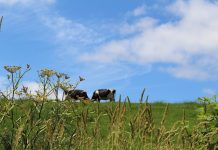COLUMBIA, Mo. — The use of biomass as an alternative energy source has grown rapidly, but most biomass materials such as switchgrass or corn are bulky and therefore costly to handle, store and transport.
The University of Missouri and Columbia-based Ecologic Tech are developing an innovative “tabletizer” machine to mass-produce dense biomass tablets of various sizes at a low cost.
A prototype is being tested at the university’s Bradford Research and Extension Center.
Reduce size (and costs)
“The goal is to test and develop a special machine that can press biomass materials into dense tablets without having to use heat or binder,” said Jesse VanEngelenhoven, Ecologic Tech research director.
“The machine is designed to reduce the overall cost of utilizing biomass for liquefaction, gasification and heat generation.”
Giant squeezer
The machine roughly resembles a large juice squeezer in which bulk quantities of switchgrass or corn stalks are pressed into tablets about 6 inches in diameter.
If the prototype is successful, the second phase of the project will be to construct a commercial-scale densifier, which VanEngelenhoven estimates could produce about 17, 000 tons of biomass tablets a year.
The tablets could provide fuel for co-firing with coal in stocker and fluidized-bed boilers for power generation, fuel for heating buildings and feedstock for producing charcoal. Primary markets would be power plants and ethanol plants.
The key to producing the tablets is obtaining a “sweet spot” where the tablet is dense enough to hold together yet loose enough for air to enter when placed in a fire, VanEngelenhoven said.
Value-added
Ideally, biomass material could be bought from local farmers, turning the biomass waste into a usable energy source.
“All the waste that farmers would normally throw away could be brought to a central processing center, compacted and then sold as a value-added product,” he said.
“This would open markets for local agricultural products,” said Tim Reinbott, Bradford Farm superintendent. “With these bulk materials, transportation is expensive. If you had a machine that could be mobile then you could condense the biomass on-site.”
Reinbott said the machine would also help with testing the mixtures of grasses, legumes and forbs that researchers at Bradford are studying as an alternative to monocultures of biofuel crops.











